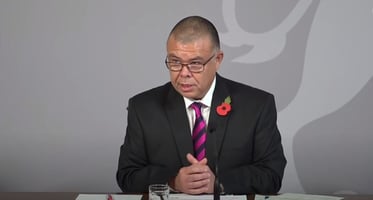Last week was a strange one for media interviews.
One day we are looking at the problems Huawei is facing in media interviews and the next we are analysing an interview about turning grouse moor into a nature reserve.
Two hugely different issues, but both raise important media training issues other media spokespeople can learn from.
If you watched Channel 4 News on Monday (20/7), you may have seen a report about a group of Scottish villagers in Dumfries and Galloway that is hoping to raise more than £6m to turn the UK’s most famous grouse moor into a new 10,000 acre nature reserve.
That land currently belongs to the Duke of Buccleuch - the second-largest private landowner in Britain – and he wants £6.5m for it.
It was an interview that didn’t go well – even the reporter Alex Thomson described it as a ‘car crash’ on social media.
Car crash performance tonight from Duke of Buccleuch’s man (and Nicola Sturgeon’s advisor) Benny Higgins. Makes false claims that people don’t give land away and either can’t or won’t explain why the Duke won’t be interviewed. pic.twitter.com/Xy60fHX0EL
— alex thomson (@alextomo) July 20, 2020
But what stood out for me about the report, which you can watch here, was how little time Buccleuch was given to get its side of the story across.
All we saw was Benny Higgins, the chairman of Buccleuch, defend why he was giving the interview rather than the duke, and eventually face questions about whether it was right that if the residents raised the money – with some of it coming from a grant – the estate would benefit from taxpayer’s money.
Why was this?
Well, the first reason is that the reporter seemed determined to speak to the duke himself. He was seen driving to various properties to track him down.
And when he did manage to get hold of him on a phone, the duke claimed there was something wrong with it and that he couldn’t hear anything. That phone subsequently went through to voicemail.
This created a narrative that the duke was running scared from scrutiny - and that theme dominated the initial questions put to Mr Higgins, who ultimately agreed to speak on his behalf. It put him firmly on the back foot.
Here is the key exchange:
Thomson: “The duke as I understand it won’t talk to us, why is that?
Higgins: “The duke has stepped back from the business and I became executive chairman last year. So, it is me who is running the business and I am the right person to speak to.”
Thomson: “Could we interview him?”
Higgins: “You’d need to ask him.”
Thomson: “I’m asking you. You can get a message to him.”
Higgins: “I’m telling you I’m running the business. There are no answers to questions you have asked he is better placed to answer at the moment.”
Thomson: “Is he afraid?”
Higgins: “I am the executive chairman of Buccleuch and any question you have got can be answered by me. “
Not the best start to an interview.
When it moved on, Mr Higgins faced questions about whether it was right the duke would benefit from taxpayer’s money – the community has secured a grant towards some of the cost - when the country is trying to recover from COVID-19.
“We are running a business and we have put the land up for sale,” Mr Higgins said. “The communities are interested in that land. If they don’t buy it, we will sell it to someone else.”
Asked whether they should give the land away, he replied: “Businesses don’t give assets away and we are not giving it away.”
When he was asked why other landowners were able to do it, he said: “That’s for other landowners, we are running a business.”
You don’t need me to tell you this all sounded defensive and evasive and you got the impression Mr Higgins didn’t really feel he needed to answer these questions.
So, what can we learn from this?
Well, when we speak to delegates at the start of our media training courses – which can now be run face-to-face or on videoconferencing software - many believe that pre-recorded interviews offer the safer broadcast option.
After all, if you make a mistake or suffer some brain fade you can do it again.
It is easy to understand the appeal.
But actually, pre-recorded interviews can put spokespeople under more pressure.
From what I have seen, it seems unlikely Buccleuch had the option of giving a live interview in this case.
But if they had, it is unlikely Mr Higgins would have faced so many questions about whether he was the right person for the interview. Pre-recorded interviews don’t have the time constraints of live ones, giving journalists more time to probe different angles and increase the pressure.
One of the other key issues is that with pre-recorded interviews, editorial control is surrendered to the journalist.
They decide what is going to be included in the report and how much of the interview they will show.
But what if a pre-recorded interview is the only option, as seems to have been the case here?
Well, you need to have a plan and think about what you want those watching to think and feel.
Did Buccleuch want to leave viewers with the feeling that it was defensive, obstructive and uncaring? Probably not.
But then it didn’t seem to have a message that it wanted to get across, or if it did, Mr Higgins wasn’t proactive about using it.
In a pre-recorded interview you need to constantly bring the conversation back to your message because the chances are the right question won’t come along, and even if it does, there is no guarantee it will make the edit.
Mr Higgins could have even done this with the questions about whether he was the right person to give the interview. He could have said something like: “I am the executive chairman and I manage the business on a day-to-day basis and part of that means I am working closely with the residents on this sale. I met with them just the other day and we discussed…” (Presuming this is true).
Not only does this approach make it more likely you will get your message across when the report is aired, but you also avoid the short, unhelpful, defensive answers that never look good.
Interestingly, right at the end of the piece, we learnt that the duke had just extended the deadline for the town to find the money it needs, while the news report was being put together – ‘pure coincidence, no doubt’ as Mr Thomson put it.
But that would have been a lot more impactive if it had been said in the interview. It would have helped Mr Higgins to move the story forward – meaning it was more likely to be included in the edit - and helped to show both himself and Buccleuch in a more positive light, flexible and trying to help the community.
The late, ‘coincidental’ timing of that news, suggested it was little more than an attempt to limit some of the damage from a poorly handled interview.
Whether it is a company involved in cutting-edge technology, the owners of a large estate, or anything in between, there is always much that can be learnt from a flawed approached to media interviews.
Media First are media and communications training specialists with over 35 years of experience. We have a team of trainers, each with decades of experience working as journalists, presenters, communications coaches and media trainers.
Subscribe here to be among the first to receive our blog.




